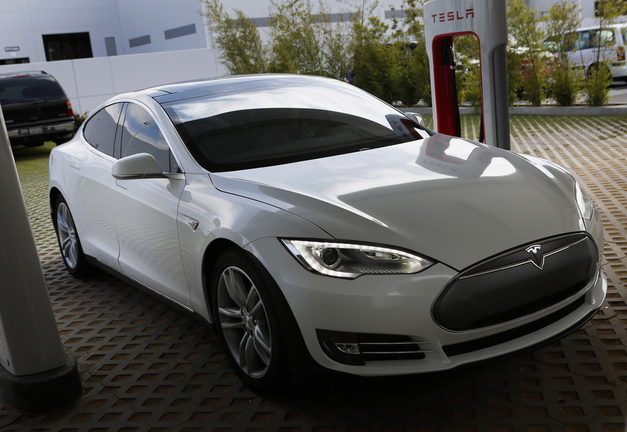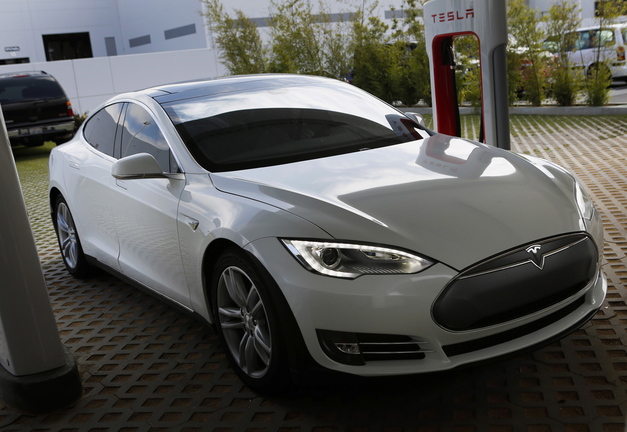WASHINGTON — Tesla Motors was in trouble in North Carolina. Prohibited from opening showrooms there, it was on the way to being unable to sell cars at all when the state Senate voted unanimously to block online auto sales.
Then Tesla turned out a lobbying weapon that, in the home state of stock-car racing’s hall of fame, spoke louder than money: It parked a Model S at the Capitol and invited lawmakers and Gov. Pat McCrory, R, to take it for a spin.
“When you accelerate it, it was the same sort of feeling I got when I test-drove a Mustang Boss back when I was probably 23 years old,” Republican House Speaker Thomas Tillis, 53, told the Raleigh News & Observer.
So ended the anti-Tesla legislation. Tillis’s chamber never voted on it.
Chief Executive Officer Elon Musk’s strategy of selling his $70,000-and-up electric car directly to customers through the Internet or company galleries has pitted him in at least seven states against franchised dealers who view Tesla’s marketing and sales models as threats to their existence.
Tesla delivered about 5,500 Model S vehicles in the third quarter, more than twice as many as it did in all of last year. It said Nov. 6 it plans to deliver “slightly under 6,000” this quarter, with Musk saying demand exceeds supply. Its sales depend on access to customers, which it reaches through showrooms modeled on those of tech companies.
The fight with dealers isn’t the company’s sole challenge. Tesla also faces a threat in Washington, where its Model S is under U.S. investigation following three battery fires, and three workers were injured Nov. 13 at its only assembly plant in an industrial accident.
At both the state and federal level, the Palo Alto, Calif.-based company is running a risk Microsoft faced in the 1990s, when it found itself in the midst of a government antitrust action without an experienced advocacy team to shepherd it through the system and build allies for the future.
Musk is putting his star power against one of the best connected and most experienced U.S. lobbies, which has outspent Tesla by multitudes in state capitols.
Dealers spent $86.8 million on state election races across the U.S. between 2003, when Musk created Tesla, and last year, according to the National Institute on Money in State Politics, a nonprofit in Helena, Mont. They’ve also pumped $53.7 million into federal campaigns, the Center for Responsive Politics found. Tesla’s investment in state and federal politics was less than $500,000, those same sources show.
“The challenge we face, of course, is that the auto dealers are very strong and very influential at the state level, among the legislatures,” Musk told shareholders in June. Dealers, he said, are “making it harder to get things done.”
James Chen, Tesla’s vice president for regulatory affairs, didn’t respond to a phone call and email seeking comment for this story. Diarmuid O’Connell, vice president for business development, didn’t provide comment when reached by email. Liz Jarvis-Shean, a spokeswoman, didn’t respond to an email seeking comment.
New York’s Assembly this year scrapped a bill that would’ve stopped Tesla sales. Virginia granted Tesla one showroom license after initially turning it down.
The showmanship that worked in North Carolina failed in Texas, where dealers spent nine times more than the company on 2012 elections and lobbying. Employees at Tesla’s Texas galleries can’t sell cars, offer test drives or discuss prices after legislation to repeal those restrictions failed to come to votes this year.
“The only people who are opposed to Tesla are the dealers,” said Massachusetts state Rep. David Linsky, a Democrat, whose district includes the company’s only gallery in the state. “Every legislator has auto dealers in their district, and they’re out in force.”
Tesla’s strategy hinges on its sales model, said Colin Rusch, a senior analyst with Northland Capital Markets.
“They have direct control over their brand and their consumer relationships,” said Rusch. “They’re able to put their products in the best light and there aren’t competing interests.”
Dealers counter their model is better for consumers, by giving them a consistent place to go for service, and for automakers, by taking sales costs off their balance sheets.
“With factory-owned stores, if the factory goes out of business, so does the store,” said Tim Jackson, chief executive officer of the Colorado Auto Dealers Association, citing the examples of General Motors Co. brands that ended when the company was restructured in bankruptcy.
“If and when Tesla falls on hard times and shuts down, all of the service centers shut down at the same time because they are all factory-owned,” he said.
Send questions/comments to the editors.




Success. Please wait for the page to reload. If the page does not reload within 5 seconds, please refresh the page.
Enter your email and password to access comments.
Hi, to comment on stories you must . This profile is in addition to your subscription and website login.
Already have a commenting profile? .
Invalid username/password.
Please check your email to confirm and complete your registration.
Only subscribers are eligible to post comments. Please subscribe or login first for digital access. Here’s why.
Use the form below to reset your password. When you've submitted your account email, we will send an email with a reset code.